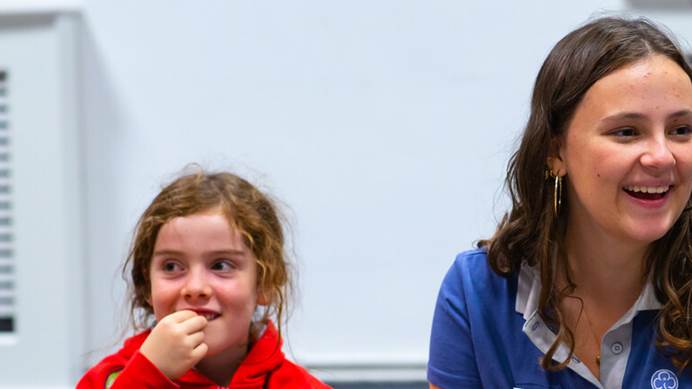What's next for women's football?
Girlguiding advocate Alice writes what UEFA Women's EURO 2022 meant to girls, and what's next for women's football
The 31st July 2022 is a day that has gone down in English footballing history.
From Ella Toone’s chip to Chloe Kelly’s iconic celebration, England's victory was a huge moment for women’s football. But like many people, I asked myself, what now?
At Girlguiding, we’ve had tournament fever for a while. With our UEFA Women’s EURO 2022 partnership toppers, water bottles and badge, lots of us have been getting into the football spirit. What’s more, the Lionesses even have their own personal connection to Girlguiding, with wider squad member Katie Zelem having been a Rainbow, joining final goal-scorer Ella Toone to lead an amazing football session with Girlguiding units in Manchester.
Watching the final of the UEFA Women’s Euro 2022, it felt like the whole country was getting into the spirit of women’s football. But according to our own research, 73% of girls aged 11 – 17 would like to see women’s football celebrated more in the media. Women’s football fans have been asking important questions about media coverage of the women’s game for some time. But this tournament has brought them into the mainstream. The idea that ‘it needs to be a gradual process’ is starting to get old.
Many women’s football fans who’ve watched the game for a while heard this after the World Cup in 2015, Euros in 2017 and World Cup again in 2019. But now it’s more high-profile voices joining the conversation. Ex-Watford and England goalkeeper Ben Foster made a podcast singing the praises of his experience of the final, and yet continued to refer to this need for gradual growth. But what is the point of having this tournament staged in England so successfully without being able to harness that momentum in all areas of the game?
Just days after the tournament, the Lionesses posted an open letter to Twitter asking our next Prime Minister to ensure all girls and young women have access to football.
"We see this as only the beginning."
— Lionesses (@Lionesses) August 3, 2022
An open letter from our #Lionesses... pic.twitter.com/Ty9kA7zgGa
There's definitely a need for girls to access more sport throughout their time at school, and not just sports that are typically seen as more masculine. Football and rugby was just for boys throughout my time in primary and secondary school, with the exception of a couple of lessons a week for half a term. Many of the stars of UEFA Women’s EURO 2022 have spoken out about their experiences of facing discrimination when playing the game when they were younger within all-male settings. Along with more opportunities to play in girls' teams, girls need to be given the option to access football - and sport as a whole - to whatever level they'd like to.
From my perspective, I would love to see the progression of the women’s game without losing its inclusive element. The openness of the players helps create this welcoming, family atmosphere. Many of the best players in the world are open about their sexuality and backgrounds including the likes of Alex Scott and Vivianne Miedema - both trailblazers within the wider football world. I loved being in the crowd when the Lionesses played the USA at Wembley in October, a game which sold out in record time. I’m also looking forward to going to watch Manchester United in the Barclays Women's Super League.
I’ll continue to raise the profile and support women’s sport both inside and outside my units and wider Girlguiding. A summer of sporting success for football, hockey and countless other sports should be the platform to improve the sporting opportunities for this generation and the next. But it’s up to us and key change makers to allow this to happen. The future is one of increased equality, we just need to let it happen.
Get girls involved with football
To find out about how to get girls involved in football, visit England Football for playing opportunities, nationwide, for all ages and abilities.




